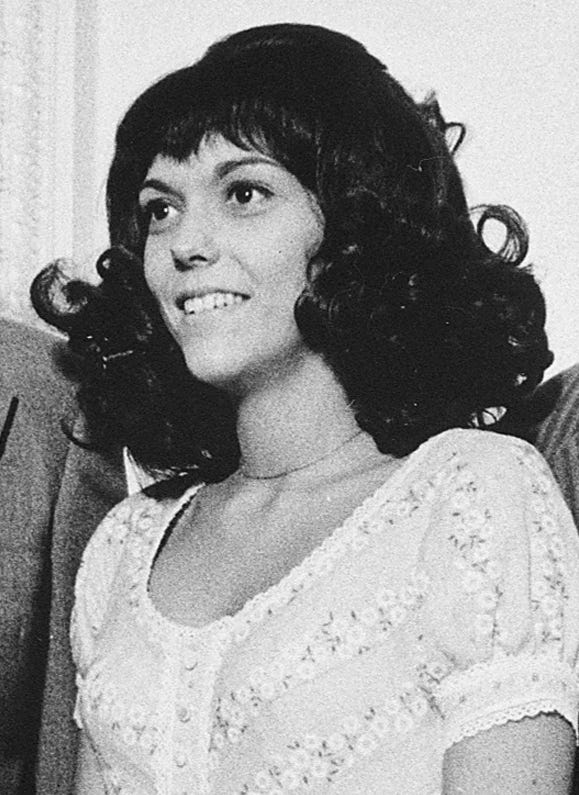When Karen Carpenter Died
The most memorable voice in American pop culture — who thought she was only a drummer.
When Karen Carpenter Died
The most memorable voice in American pop culture — who thought she was only a drummer.
By Jim Reynolds | www.reynolds.com
Downey, California, late 1950s.
Just another Southern California suburb — orange groves giving way to tract houses, kids riding bikes, parents working hard. But out of that ordinary soil came something extraordinary: Richard and Karen Carpenter.
My brother Jeff was there. He sang with them, played bass trombone and standup bass, and later spent decades with the LA Phil. In those early Long Beach State choir days, he remembered Richard as the obvious prodigy — the kind of piano and vocal talent that made people stop mid-sentence. Karen? She was the younger sister and drummer. A good one. A contest winner, even. But nobody foresaw what her voice would do to the world. Least of all Karen.
Drumming is merciless
There’s no place to hide. You’re either rhythmic or you’re not. Karen was — absolutely. And that perfectionism carried into everything. She brought a percussionist’s discipline into her phrasing, her breath control, her time. That’s why she could sing two inches from the mic and sound like she was whispering only to you.
Jeff told me that one of their secrets was in the harmonies. They reached for ninths in a pop world living on sevenths. Richard had the jazz chops to structure it, and Karen had the uncanny discipline to make it glide. Add in the Long Beach State choral rigor — entrances sharp, cutoffs clean, vowels aligned — and you had more than talent.
You had a perfection mandate.
Their harmonic blend was uniquely familial — Richard’s lightness carried above, while Karen’s subtle power held beneath. Together they made a sound no one else has ever recorded, and no one ever will.
And then there was her trademark move. Jeff called it “laying an egg.” Dropping a low alto line with absolute authority. Not loud, not flashy — but immovable. That was the essence of their sound: Richard building cathedrals of harmony, Karen anchoring them with a foundation you could lean your life against.
All done in perfect harmony and perfect time. Jeff said that he was invited by Richard to a recording session once. I recall him telling me how emphatic Richard was about exactly how each word was enunciated within a phrase. That is a call for perfection unknown before the Carpenters.
I saw them live in 1973, in Santa Barbara — after they had made the “big time”.
Susan and I sat in the summer air, watching Karen still behind the drums — no stand-ins yet — with Cubby alongside. They played with the same precision live as on vinyl. Behind the stage sat their matching Mercedes convertibles, license plates personalized, a perfect symbol of their ascendant moment. They didn’t just perform songs. They embodied clarity.
And then, ten years later, she was gone.
The day I learned that Karen had died, I drove to the record store — yes, they still had them in 1983 — and bought five of her albums. I still have them. It wasn’t collecting. It was clinging. Trying to hold onto a voice that already felt like it had slipped out of the world.
Karen Carpenter died in 1983. America lost more than a woman. We lost the most memorable voice in American pop culture. The voice of sincerity. The voice that whispered instead of shouted, that invited instead of demanded.
She thought she was just a drummer. But she sang like America’s conscience.
When she died, we lost our permission to be gentle, to be exact, to be sincere without irony. Pop music got louder, flashier, more cynical. The intimacy vanished.
Bob: “When Karen Carpenter died, America traded harmony for noise.”
Even now, decades later, Jeff still calls Richard “Dick.” The memory isn’t just cultural — it’s personal. It’s Downey streets and Long Beach choirs, California summers and whispered alto notes laid down like bedrock.
And when she left, something essential left with her. She sang so close to the mic it sounded like she was singing only to you. Maybe she was. That’s why, when she died, it felt like we all lost a friend we’d known forever.
Grook for Karen
A perfect note,
once sounded,
does not fade.
It lingers in silence,
waiting for us
to listen again.



